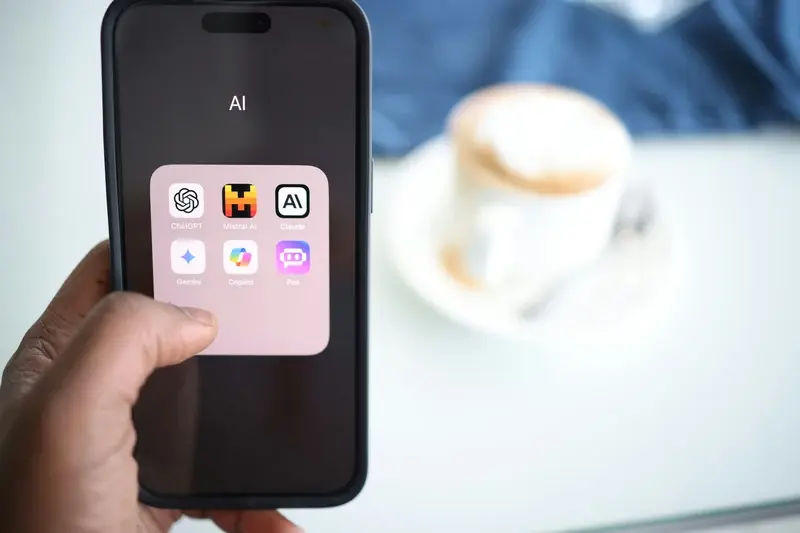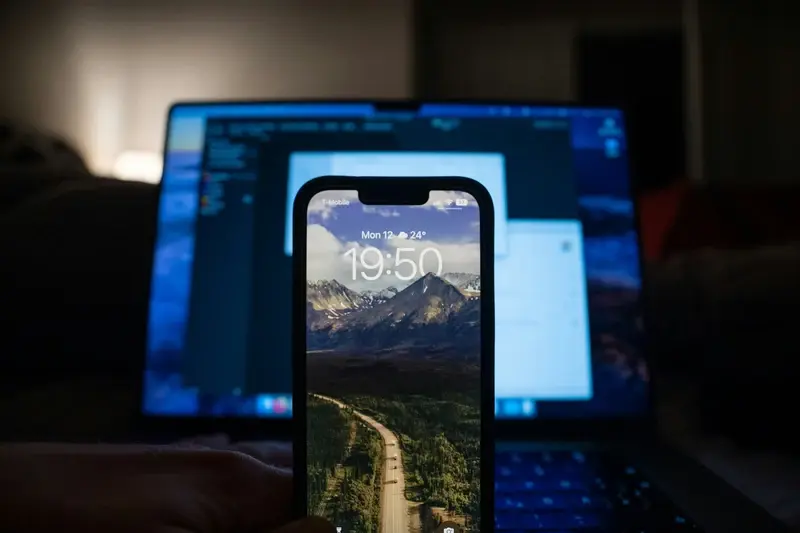How Hard Is It To Develop A Mobile App?
If you're reading this guide, chances are you've had that exciting lightbulb moment - an app idea that could change the world, or at least make it a bit better. Perhaps you're feeling a mix of enthusiasm and uncertainty, wondering if bringing your app idea to life is as complicated as it seems. We completely understand those feelings, having guided hundreds of innovators just like you through their app development journey over the past eight years.
Building an app is like constructing a house - with proper planning, the right tools, and expert guidance, what seems overwhelming at first becomes an achievable step-by-step process
The truth is, developing a mobile app can be quite challenging - rather like learning to ride a bike or mastering a new language. However, it's far from impossible, and understanding what lies ahead is half the battle. Think of this guide as your friendly companion through the app development landscape, helping you navigate everything from choosing the right platform to managing development costs.
What to Expect from This Guide
Throughout the following chapters, we'll break down the app development process into digestible chunks, sharing practical insights we've gained from developing hundreds of apps across various industries. Whether you're a business owner looking to expand your digital presence or an entrepreneur with a groundbreaking idea, we'll help you understand exactly what it takes to turn your vision into reality.
Remember, every successful app you see today - from Instagram to your local takeaway's ordering system - started exactly where you are now: with an idea and a determination to make it happen. Let's begin this journey together, shall we?
Understanding App Development Basics
When you first think about developing a mobile app, it might feel like standing at the foot of Mount Everest - overwhelming and a bit scary. At Glance, we've guided hundreds of clients through this journey, and we'll help you understand the fundamental building blocks that make up modern app development.
The Three Core Pillars
Think of app development like building a house. You've got three main components: the frontend (what your users see and touch), the backend (where all the behind-the-scenes magic happens), and the database (where all your app's information lives). Just as you wouldn't build a house without proper foundations, these elements work together to create a stable, functioning app.
The Development Process Simplified
Remember learning to ride a bicycle? You didn't just hop on and speed away - you started with stabilisers, then gradually built up your confidence. App development follows a similar pattern. It begins with wireframes (rough sketches of your app), moves to design, then to actual coding, and finally to testing and refinement.
While it might sound technical, modern development tools have made this process more accessible than ever. Think of popular apps like WhatsApp or Instagram - they all started with these same basic principles. The key difference between a good app and a great one often lies in how well these fundamentals are implemented.
Don't worry if this feels like a lot to take in - that's perfectly normal! As we move through this guide, we'll break down each element into bite-sized pieces that will help you understand exactly what goes into creating your dream app.
Choosing Your App Type and Platform
Deciding on your app type and platform might feel like choosing what to watch on Netflix - overwhelming at first, but exciting once you know what you're looking for! After working with hundreds of businesses over the past eight years, we've learned that this decision stage often causes the most head-scratching moments for our clients.
Types of Mobile Apps
Let's break this down into digestible chunks. Mobile apps generally fall into three main categories:
- Native apps (built specifically for iOS or Android)
- Cross-platform apps (work on multiple operating systems)
- Progressive Web Apps (PWAs, which run through web browsers)
Choosing Your Platform
Think of platforms like neighbourhoods - each has its own culture and community. iOS users typically spend more on apps, while Android offers a larger global reach. Your choice often depends on your target audience and budget. For instance, if you're launching a luxury shopping app in the UK, iOS might be your best bet, as iPhone users tend to have higher spending habits.
Remember, you don't always have to choose just one. Many successful apps start on a single platform to test the waters (much like opening one shop before expanding to multiple locations) and then grow from there. This approach helps manage costs and reduces initial complexity.
Before making your final decision, download and use similar apps on different platforms. Pay attention to how they feel, perform, and engage users. This hands-on research is invaluable for understanding what works best for your specific needs.
Planning Your App Project
Planning your mobile app is a bit like planning a road trip - you need to know where you're going, how you'll get there, and what you'll need along the way. After working with hundreds of app projects over the past eight years, we've learned that proper planning can make the difference between a smooth journey and a bumpy ride.
Creating Your App Blueprint
Start by getting all your ideas down on paper. Think about what problem your app will solve and who will use it. Just like building a house, you'll need a solid foundation. Sketch out your app's main features and create simple wireframes - they don't need to be perfect, even rough drawings will do! We often see clients use sticky notes on a wall to map out their user journey, and it works brilliantly.
Setting Realistic Milestones
Break your project into manageable chunks, rather like chapters in a book. Set realistic timelines for each phase, remembering to include buffer time for unexpected challenges (trust us, they always pop up!). You might want to start with a basic version of your app - what we call a Minimum Viable Product (MVP) - rather than trying to include every feature at once. It's like starting with a bicycle before building a motorcycle.
Remember to consider your budget, technical requirements, and available resources during this planning phase. You'll also want to research any regulations or compliance requirements for your app, especially if you're handling user data. Think of it as checking the weather forecast before your journey - it's always better to be prepared!
Essential Skills and Resources
When embarking on your mobile app development journey, it's natural to feel overwhelmed by the array of skills and resources needed. Having guided hundreds of clients through this process, we understand that feeling all too well.
Core Skills Required
At its heart, mobile app development requires a blend of technical and soft skills. Programming languages like Swift (for iOS) or Kotlin (for Android) form the foundation, but don't panic! Many successful app projects start with basic coding knowledge and grow from there. Think of it like learning to cook - you don't need to be a master chef to start, but understanding the basic ingredients helps tremendously.
The most valuable skill in app development isn't coding - it's the ability to solve problems creatively whilst keeping the end-user in mind
Essential Resources
Beyond skills, you'll need reliable tools and resources. A proper development environment (IDE), version control systems like Git, and testing devices are fundamental. Remember when we first started developing apps back in 2015? We learned that having access to both physical devices and simulators makes a world of difference in testing.
Don't forget about learning resources! Whilst traditional coding bootcamps work brilliantly for some, others thrive with online courses or documentation. We've seen brilliant apps come from developers who learned through YouTube tutorials and Stack Overflow. The key is finding learning resources that match your style - whether you're a visual learner or prefer hands-on practice.
Remember, every developer started somewhere, and the technology community is incredibly supportive. The resources are out there - it's just about finding the right combination that works for you.
Common Development Challenges
If you're feeling a bit nervous about the potential hurdles in your app development journey, you're not alone. After helping hundreds of businesses bring their app ideas to life, we've seen that certain challenges tend to pop up time and time again - rather like that one relative who always shows up uninvited to family gatherings!
Let's tackle these challenges head-on, shall we? Understanding them beforehand can help you prepare better and avoid that dreaded midnight panic when things don't go as planned.
Most Common App Development Hurdles
- Feature Creep: The temptation to keep adding "just one more feature" can derail your timeline and budget. Think of it like packing for a holiday - you can't take everything!
- Cross-Platform Compatibility: Making your app work seamlessly across different devices is like trying to bake a cake that pleases everyone at the party.
- Performance Issues: Ensuring your app runs smoothly without draining battery life or hogging memory space.
- User Experience Conflicts: What seems logical to developers might not be intuitive for users.
- Security Concerns: Protecting user data is becoming increasingly complex in today's digital landscape.
Remember, facing challenges doesn't mean your app idea isn't brilliant - it's simply part of the journey. Just as you wouldn't expect to learn to ride a bicycle without a few wobbles, developing an app comes with its own learning curves. The key is to anticipate these challenges and plan accordingly, rather than letting them catch you off guard.
Time and Cost Considerations
Let's address the elephant in the room - how long will your app take to build, and how much will it cost? We know these questions keep many aspiring app creators awake at night, and rightfully so. Having guided hundreds of clients through this journey, we'll help you understand what to expect.
Typical Development Timeframes
A simple app with basic features typically takes 3-6 months to develop. Think of it like building a house - a modest bungalow takes less time than a three-storey mansion! More complex apps, like those requiring user authentication, payment processing, or real-time features, usually need 6-12 months. Remember how Instagram wasn't built in a day? It actually took about eight months to launch their first version!
Understanding the Costs
App development costs vary dramatically, much like buying a car - you could opt for a reliable Ford Focus or splash out on a Ferrari. A basic app might start around £20,000, while complex applications can exceed £100,000. The main factors affecting cost include feature complexity, platform choice (iOS, Android, or both), design requirements, and integration needs.
What surprises many people is that the initial development cost isn't the whole story. You'll need to budget for ongoing maintenance, updates, and server costs - typically about 15-20% of your development cost annually.
Consider starting with a Minimum Viable Product (MVP) to test your app idea with real users before investing in a full-featured version. This approach can save both time and money while reducing risk.
Building Your Development Team
After years of helping businesses bring their app ideas to life, we've learned that building the right development team is a bit like assembling a cricket team - you need different skills and personalities working in harmony. Whether you're a startup founder or an established business owner, getting this step right can make or break your app project.
Key Team Members You'll Need
- Project Manager - Your captain who keeps everything on track
- UI/UX Designer - The creative mind behind your app's look and feel
- Mobile Developers - Your technical wizards who write the code
- Backend Developer - Handles everything happening behind the scenes
- QA Engineer - Your guardian who ensures everything works perfectly
Finding the Right Balance
We often see clients struggling with whether to hire an in-house team, work with freelancers, or partner with an agency. Each option has its merits, and the right choice depends on your specific circumstances. Think of it like choosing between buying, renting, or staying at a hotel - there's no universal right answer.
If you're just starting, you might feel overwhelmed by all these roles. That's perfectly normal! Remember that you don't necessarily need to hire everyone at once. Many successful apps started with a lean team of just 2-3 core members who wore multiple hats. The key is finding people who are not only skilled but also share your vision and can communicate effectively.
Whatever path you choose, prioritise experience with your chosen platform (iOS or Android) and look for team members who have successfully launched apps similar to yours in scale and complexity.
Testing and Quality Assurance
After spending countless hours developing your app, it's tempting to rush straight to launch. We've seen many eager developers fall into this trap, but proper testing is absolutely crucial for your app's success.
Why Testing Matters
Think about how frustrated you feel when an app keeps crashing or doesn't work as expected. Your users will feel the same way if you don't thoroughly test your app. It's like proof-reading an important email - you wouldn't send it without checking for mistakes, would you?
The true cost of skipping proper testing isn't measured in pounds and pence - it's measured in lost users and damaged reputation
Essential Testing Steps
From our experience working with hundreds of apps, we've found that comprehensive testing should include functional testing (making sure everything works), usability testing (checking if it's user-friendly), performance testing (ensuring it runs smoothly), and security testing (protecting user data). It's rather like giving a new car a thorough check before taking it on the motorway.
Remember to test your app across different devices and operating system versions. That brilliant animation might work perfectly on your brand-new iPhone, but what about on a three-year-old Android device? We've learned that real-world testing with actual users can uncover issues that even the most sophisticated automated tests might miss.
While it might seem like a faff, proper testing typically saves time and money in the long run. After all, it's much easier to fix issues before your app reaches thousands of users than to deal with a flood of negative reviews and emergency updates later.
Conclusion
Developing a mobile app is rather like building your dream house - it requires careful planning, the right expertise, and a clear vision of what you want to achieve. Throughout this guide, we've walked you through the various aspects of mobile app development, and hopefully, you're now feeling more confident about embarking on your app development journey.
The Road Ahead
Whether you're a startup founder with a brilliant idea or an established business looking to expand your digital presence, remember that successful app development isn't about following a rigid formula. It's about understanding your users' needs, making informed decisions about technology, and being prepared to adapt along the way.
Yes, app development can be challenging - much like trying to complete a complex puzzle. You'll need to consider various elements such as platform choice, development approach, testing requirements, and ongoing maintenance. However, with proper planning, the right team, and realistic expectations about time and resources, these challenges become manageable stepping stones rather than overwhelming obstacles.
Your Next Steps
As you move forward, remember that every successful app started with a single step. Whether you choose to develop in-house, work with an agency, or use a hybrid approach, focus on creating value for your users. Keep in mind that your first version doesn't need to be perfect - many successful apps like Instagram and Facebook started with basic features and evolved based on user feedback.
The mobile app development landscape is constantly evolving, but the fundamentals we've covered in this guide remain constant. Stay curious, keep learning, and don't hesitate to seek expert guidance when needed. After all, every developer was once a beginner, and every successful app started as just an idea.
Making Your App Stand Out in a Crowded Marketplace
After putting your heart and soul into developing your mobile app, the next big challenge is ensuring it doesn't get lost in the sea of millions of applications. With our experience helping countless app creators navigate this journey, we understand how daunting this final hurdle can feel.
Think of your app like a small shop on a bustling high street in London – it's not enough to simply open your doors and expect customers to flood in. You need to create an experience that makes people want to stop, look around, and ultimately stay.
The secret to standing out isn't just about flashy features or cutting-edge technology. It's about solving real problems in a way that feels natural and intuitive to your users. Perhaps you've noticed how apps like Deliveroo succeeded not just because they delivered food, but because they made the whole process delightfully simple.
Focus on creating a strong unique selling proposition that sets your app apart. This could be anything from an innovative feature to an exceptional user experience. Remember how WhatsApp initially stood out simply by offering a cleaner, more reliable messaging experience?
Keep in mind that your app's success often boils down to the little details - smooth animations, thoughtful error messages, and intuitive navigation can make the difference between an app that users love and one they quickly uninstall. Consider how your favourite apps make you feel when you use them, and aim to create that same positive emotional connection with your users.
Share this
Subscribe To Our Learning Centre
You May Also Like
These Related Guides

How Do I Plan For Multi-Platform App Architecture?

How Can You Successfully Integrate AI into Your Mobile App?



